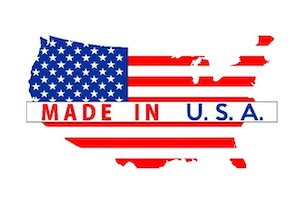The Federal Trade Commission (“FTC”) has recently begun placing more of an emphasis on Made in the USA (“MUSA”) labeling violations. A MUSA violation occurs when a company labels its product with “Made in the United States” or “USA Made Products,” among other similar phrases, when in fact the country of origin (“COO”) of the product is not the United States. When this type of violation occurs, it harms domestic companies who are manufacturing the items in the USA. Companies will often try to claim that an item is made in the USA as it can provide additional credibility to the quality of the product. The increased enforcement by the FTC was due to the fact that the agency was seeing a rise in MUSA violations without the commensurate enforcement action against the violative act.
On July 14, 2021, the FTC issued a final rule related to “Made in USA” and other unqualified U.S.-origin claims on product labels.[1] The final rule codified the Commission’s previous MUSA Decisions and Orders and prohibited marketers from making unqualified MUSA claims on labels unless: (1) Final assembly or processing of the product occurs in the United States, (2) all significant processing that goes into the product occurs in the United States, and (3) all or virtually all ingredients or components of the product are made and sourced in the United States. The rule also covers labels making unqualified MUSA claims appearing in mail order catalogs or mail order advertising. In addition, to avoid confusion with other COO labeling laws and regulations, the notice stated, “that it does not supersede, alter, or affect any other federal or state statute or regulation relating to country-of-origin labels, except to the extent that a state country-of-origin statute, regulation, order, or interpretation is inconsistent with the rule.” The FTC stated that the motivation for the rule was a “rampant Made in USA fraud” that ultimately harms U.S. consumers and U.S. companies, and also indicated that the rule should “particularly benefit small businesses that rely on the Made in USA label but lack the resources to defend themselves from imitators.”
As part of the final rule, the FTC also added part 323 to subchapter C of title 16 of the Code of Federal Regulation, titled “Made in USA Labeling.” Part 323 is divided into six sections, with the most notable section arguably being part 323.4, Enforcement. It states, “Any violation of this part shall be treated as a violation of a rule under section 18 of the Federal Trade Commission Act, 15 U.S.C. 57a, regarding unfair or deceptive acts or practices.” So, what does this mean? Based on the new language, the FTC can now impose civil penalties of up to $43,280 for each violation! This amount can add up quickly for importers who have hundreds or thousands of shipments each year.
As an example of the increased enforcement, the FTC recently finalized a consent order imposing an $800,000+ judgment against a U.S. company for MUSA violations. In that case, a U.S. company previously used U.S.-made textiles to manufacture its mattress pads for trucks. In order to cut costs, the company moved production to China in 2019 and ceased using U.S.-made textiles. However, despite the sourcing change, the company continued to represent that the finished mattress pads were “Made in USA,” “Made in the USA since 1939,” and “made-in-America products.” The FTC claimed that these statements were false and violated a number of agency laws and regulations. The FTC and the U.S. company ultimately agreed to the monetary settlement with some additional labeling restrictions on the company moving forward.[2]
It is important for companies to recognize the FTC’s heightened level of enforcement for MUSA violations. Often, companies will make major sourcing changes which can affect the product processes and applicable labeling requirements. In an effort to remain compliant, companies can review the FTC website which provides an abundance of guidance related to the MUSA standard, as well as other recent examples of companies who incorrectly claimed, “Made in the USA.”[3] Businesses who are proactive and monitor potential changes in country of origin due to sourcing changes could avoid extensive MUSA violations in the future.
For any additional inquiries, or if you would like to discuss the MUSA labeling rule in more detail, please contact Jennifer Horvath at Jennifer@braumillerlaw.com, or Brandon French at Brandon@braumillerlaw.com.
[1] https://www.federalregister.gov/documents/2021/07/14/2021-14610/made-in-usa-labeling-rule.
[2] https://www.ftc.gov/business-guidance/blog/2022/08/ftc-says-made-usa-claims-about-mattress-pads-truck-bunks-were-well-bunk.
[3] https://www.ftc.gov/business-guidance/advertising-marketing/made-in-usa.
Read more articles by these authors:
Jennifer: https://www.braumillerlaw.com/author/jenniferhorvath/
Brandon: https://www.braumillerlaw.com/author/brandonfrench

